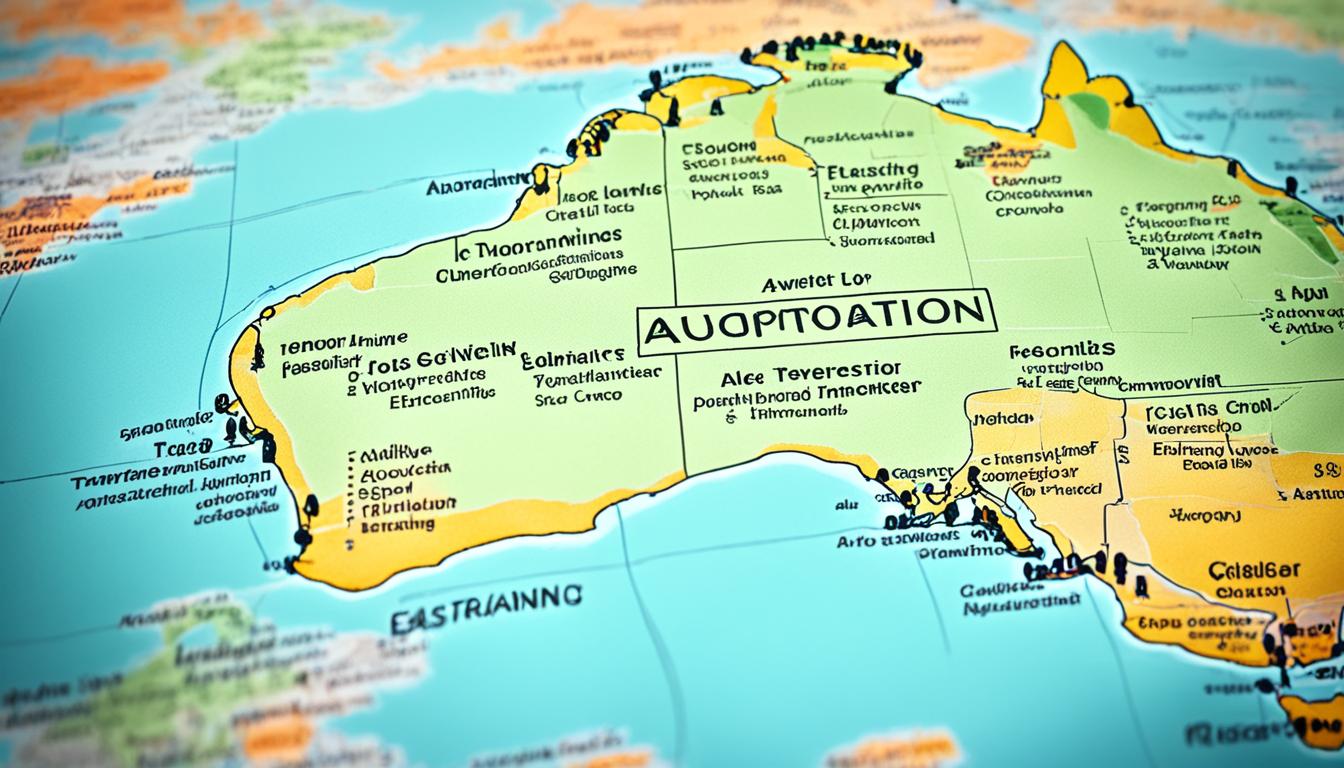
In this comprehensive guide, we will explore the age requirements for traveling alone and answer the question of how old one should be to embark on a solo journey. Whether you are planning a backpacking adventure or seeking independence, understanding the age limits for solo travel is crucial for a safe and enjoyable experience.
Key Takeaways:
- Age restrictions exist for solo travel to ensure safety and well-being.
- Each airline has its own age restrictions for unaccompanied minors.
- Accommodation providers may have different age restrictions for solo travelers.
- Legal considerations and parental consent may be required for minors traveling alone.
- Traveling alone at different ages offers unique benefits and experiences.
Importance of Age Restrictions
Before delving into the specific age requirements for solo travel, it is essential to understand why age restrictions exist. These restrictions are in place to ensure the safety and well-being of young travelers, as they may encounter challenges and risks that require maturity and independence to navigate effectively.
Solo travel can be an empowering and enriching experience, but it also comes with its own set of responsibilities and potential dangers. By imposing age restrictions, authorities and travel organizations aim to protect young individuals who may not possess the necessary skills, experience, and decision-making capabilities to handle unforeseen circumstances.
Traveling independently requires a certain level of emotional, physical, and mental readiness. Young travelers, especially those in their formative years, may lack the experience and judgment needed to handle complex situations while on their own.
Age restrictions also help to ensure that travelers have the legal capacity to make their own decisions, enter into contracts, and handle any legal matters that may arise during their journey. This is particularly important when traveling internationally, as different countries have different legal frameworks and requirements for minors.
Additionally, age restrictions help to protect young travelers from becoming targets of scams, frauds, or other exploitative activities. By limiting access to certain services and destinations, organizations can minimize the risks and vulnerabilities associated with unaccompanied minors.
It is important to note that age restrictions for solo travel are not meant to discourage young individuals from exploring the world or seeking independence. Instead, these restrictions are in place to ensure that travelers have the necessary maturity, independence, and support systems in place to embark on a safe and fulfilling journey.
By understanding the importance of age restrictions, young travelers and their parents can make informed decisions and take the necessary steps to ensure a positive and secure solo travel experience.
Age Requirements for Air Travel
When it comes to solo travel by air, it’s important to be aware of the age requirements set by individual airlines for unaccompanied minors. These requirements ensure the safety and well-being of young travelers throughout their journey. While age restrictions may vary, most airlines have a minimum age requirement for children traveling alone.
For domestic flights, the majority of airlines typically require passengers to be at least 5 years old to travel alone. However, when it comes to international flights, the age limit may be higher to account for longer travel durations and potential language barriers.
To ensure compliance with specific airline policies and any additional requirements, it is crucial to check directly with the airline before making travel arrangements for a young solo traveler.
In some cases, airlines may offer services for unaccompanied minors, providing extra care and assistance throughout the flight. These services often include designated seating, dedicated staff, and regular check-ins to ensure a smooth and safe travel experience.
Remember, it’s paramount to consider the unique needs and capabilities of the young traveler when determining the appropriate age to embark on a solo trip by air. Safety, comfort, and the ability to follow instructions independently are key factors to consider.
Key Points to Remember:
- Each airline has its own age restrictions for unaccompanied minors.
- Most airlines require a minimum age of 5 years old for solo travel on domestic flights.
- The age limit for international flights might be higher, considering longer travel durations and potential language barriers.
- Always check with the specific airline for their policies and any additional requirements.
- Consider the unique needs and capabilities of the young traveler when choosing the appropriate age to travel alone.
Supervised vs. Unsupervised Travel
When it comes to solo travel, there are two main categories to consider: supervised and unsupervised travel. Supervised travel refers to organized programs or trips where young travelers can explore the world under the guidance of trained professionals. These programs provide a structured and supportive environment, ensuring the safety and well-being of participants.
On the other hand, unsupervised travel involves young travelers exploring independently, without direct supervision or organized programs. While unsupervised travel offers a greater sense of freedom and personal growth, it also comes with additional responsibilities and considerations.
For unsupervised travel, there are generally stricter age requirements in place to prioritize the safety and well-being of underage solo travelers. These age restrictions vary depending on the destination, mode of transportation, and specific accommodation providers.
It is important for young solo travelers to carefully assess their readiness for unsupervised travel, considering factors such as maturity, independence, and preparedness. Researching and understanding the specific requirements and challenges of unsupervised travel can help ensure a positive and rewarding experience.
Supervised Travel vs. Unsupervised Travel: A Comparison
Let’s take a closer look at the differences between supervised and unsupervised travel:
| Category | Supervised Travel | Unsupervised Travel |
|---|---|---|
| Guidance and Support | Travelers are guided and supported by trained professionals throughout the journey. | Travelers are responsible for planning and navigating their trip independently. |
| Structured Itinerary | Programs typically have a predetermined itinerary with scheduled activities. | Travelers have the freedom to create their own itinerary and explore at their own pace. |
| Group Dynamics | Participants interact with fellow travelers in a group setting. | Travelers have the opportunity to meet new people and form connections along their journey. |
| Responsibilities | Program organizers handle logistics, accommodations, and safety measures. | Travelers must take charge of planning, booking accommodations, and ensuring their personal safety. |
Traveling independently allows you to discover your true capabilities, challenge yourself, and gain confidence. However, it is important to consider your age and level of maturity when deciding between supervised or unsupervised travel. Remember, safety should always be a top priority.
By carefully evaluating the pros and cons of both supervised and unsupervised travel, young solo travelers can make informed decisions that align with their goals and readiness for independent exploration.
Age Restrictions for Various Accommodations
When traveling alone, finding suitable accommodation is crucial for a comfortable and enjoyable trip. However, it is important to note that different establishments may have age restrictions for solo travelers. While some hotels, hostels, and vacation rentals may require guests to be at least 18 years old, others may have lower age limits in place.
To ensure a smooth check-in process and avoid any issues upon arrival, it is highly recommended to check the policies of the specific accommodation you plan to stay at. By doing so, you can verify the age requirements and confirm that you meet the necessary criteria. This way, you can eliminate any potential surprises or disappointments during your solo journey.
Below is a table that provides an overview of age restrictions for various accommodation types:
| Accommodation Type | Minimum Age Requirement |
|---|---|
| Hotels | 18 years old, unless accompanied by an adult |
| Hostels | Age requirements vary, typically 18-21 years old |
| Vacation Rentals | Age requirements vary, typically 18-25 years old |
It is important to note that these age restrictions can vary depending on the country, region, or even the specific establishment’s policy. Some accommodations may require a higher minimum age, while others may have certain exceptions or additional requirements for younger solo travelers.
Checking the age restrictions in advance can save you time, prevent any inconvenience, and help you find suitable accommodation that aligns with your age and travel plans. Additionally, it is always a good idea to contact the accommodation directly if you have any specific questions or concerns about their age policies.
Legal Considerations for Minors Traveling Alone
When it comes to minors traveling alone, there are additional legal considerations that vary depending on the destination and the age of the traveler. Different countries have specific age requirements or may even require parental consent forms for unaccompanied minors. To ensure a smooth and hassle-free solo journey, it is crucial to thoroughly research and adhere to the legal requirements of your desired travel destination.
Some countries may have a minimum age for independent travel, while others may require specific documentation, such as a notarized letter of consent from parents or guardians. These regulations aim to ensure the safety and well-being of young travelers, providing peace of mind for both the minors themselves and their families.
Before you embark on your solo adventure, consider the following legal considerations:
- Minimum age requirements: Check if there is a minimum age for solo travel in your chosen destination. Research the local laws and regulations to ensure compliance with age restrictions.
- Parental consent forms: Some countries may require unaccompanied minors to provide notarized consent forms from parents or legal guardians. Make sure to arrange and obtain any necessary documentation well in advance.
- Travel restrictions: Certain destinations may impose travel restrictions for minors, especially when it comes to international travel. Verify if your desired destination permits underage solo travel and if there are any additional requirements or limitations.
- Medical authorizations: Depending on your age and the destination, you may need to carry medical authorizations or proof of vaccinations. Research and consult with healthcare professionals to ensure compliance with any health-related requirements.
By thoroughly understanding and abiding by the legal considerations for minors traveling alone, you can embark on your solo journey with confidence, ensuring a safe and enjoyable experience. It is always recommended to consult official government websites or seek legal advice for accurate and up-to-date information regarding solo travel regulations for minors.

Benefits of Traveling Alone at Different Ages
Traveling alone can be a transformative experience, offering unique benefits and opportunities for personal growth at different stages of life. Whether you are a teenager seeking independence, a young adult exploring the world, or an older individual embarking on a personal journey, solo travel allows you to embark on a self-discovery adventure tailored to your needs and preferences.
Teenagers: Traveling alone as a teenager can be a formative experience, fostering independence, confidence, and resilience. It is an opportunity to step out of your comfort zone, navigate new environments, and make decisions on your own.
Young Adults: For young adults, traveling alone provides a chance to explore their identity, broaden their horizons, and gain a deeper understanding of different cultures. It allows for self-reflection, personal growth, and the development of valuable life skills such as adaptability and problem-solving.
Older Individuals: Traveling alone later in life offers a unique perspective and the freedom to explore personal interests and passions. It can be a time for self-renewal, self-care, and connecting with others who share similar experiences. Solo travel allows older individuals to rekindle their sense of adventure and create lasting memories.
Regardless of age, traveling alone can enable you to immerse yourself in new experiences, meet people from diverse backgrounds, and gain a deeper appreciation for the world around you. It provides an opportunity for introspection, self-discovery, and meaningful connections with both the destination and yourself.
Safety Tips for Young Solo Travelers
Regardless of age, safety should always be a top priority when traveling alone. As a young solo traveler, it is crucial to take extra precautions to ensure a secure and enjoyable journey. Here are some essential safety tips specifically tailored to young individuals exploring the world on their own:
1. Research Your Destination
Before embarking on your solo adventure, thoroughly research your destination. Familiarize yourself with local customs, traditions, and potential safety concerns. Stay informed about any travel advisories or warnings issued by your government.
2. Share Your Itinerary
Provide a detailed itinerary to a trusted friend or family member. Include your travel dates, accommodation details, and contact information. Regularly update them about your whereabouts to ensure someone knows your plans.
3. Stay in Safe Accommodations
Choose reputable accommodations that prioritize guest safety. Look for well-reviewed hotels, hostels, or guesthouses with security measures such as 24-hour reception, surveillance cameras, and secure locks on doors and windows.
4. Use Reliable Transportation
Opt for licensed transportation options and avoid unmarked or unofficial vehicles. Research safe public transportation routes, use trusted ride-hailing apps, or consider reputable car rental services to ensure reliable and secure transportation.
5. Stay Aware of Your Surroundings
Always be aware of your environment and trust your instincts. Stay alert in crowded areas, especially in tourist hotspots, and be cautious of suspicious individuals or situations. Avoid displaying valuable items and keep your belongings secure at all times.
6. Practice Online Safety
When using public Wi-Fi, avoid accessing sensitive information such as online banking or personal accounts. Use a virtual private network (VPN) for added security. Be cautious about sharing personal details or travel plans on social media to protect your privacy.
7. Carry Emergency Contact Information
Keep a list of emergency contact numbers, including local authorities, your embassy or consulate, and the contact information for your accommodations. Store these details in your phone and carry a printed copy as a backup.
8. Stay Connected
Maintain regular communication with friends, family, or fellow travelers. Check in with them periodically to update them on your well-being. Consider purchasing a local SIM card or using international roaming to have access to communication services at all times.
9. Trust Your Instincts
Your intuition is a powerful tool. Trust your gut feelings and remove yourself from any situation that feels unsafe or uncomfortable. If you’re unsure about a place or person, don’t hesitate to seek assistance from local authorities or trusted individuals.
10. Purchase Travel Insurance
Invest in comprehensive travel insurance that covers medical expenses, trip cancellations, and personal belongings. Make sure to carefully read and understand the policy, including the coverage and exclusions.
By following these safety tips, you can enhance your personal security, minimize risks, and enjoy a smooth and worry-free solo journey.
Preparing for Solo Travel: What to Consider
Before embarking on a solo adventure, there are various factors to consider. Thorough preparation is essential to ensure a safe and enjoyable journey. Here are some key considerations for young solo travelers:
1. Travel Insurance
Obtaining travel insurance is crucial when embarking on a solo journey. It provides financial protection against unexpected events such as medical emergencies, trip cancellations, and lost luggage. Research different insurance options and choose a policy that suits your needs and budget.
2. Destination Research
Researching your destination is vital to ensure a positive travel experience. Familiarize yourself with the local culture, customs, laws, and safety considerations. Look for information on popular attractions, transportation options, and the availability of solo-friendly accommodations.
3. Itinerary Planning
Create a detailed itinerary to make the most of your solo trip. Plan your activities, transportation, and accommodation arrangements in advance. Consider the duration of your stay, budget, and desired experiences. However, leave room for flexibility to embrace unexpected adventures and new opportunities.
4. Necessary Documentation
Ensure you have all the necessary documentation for your solo journey. This includes a valid passport, visas (if required), and any additional permits or identification documents specific to your destination. Make copies of important documents and store them separately from the originals.
Remember, thorough preparation is key to a successful solo journey. Take the time to research, plan, and organize your trip to maximize your safety and enjoyment.
As you embark on your solo adventure, equip yourself with knowledge and resources that can help you navigate new territories with confidence. Stay informed, be open to new experiences, and always prioritize your safety. Bon voyage!
Resources and Support for Young Solo Travelers
Embarking on a solo journey at a young age can be both thrilling and intimidating. Fortunately, there are numerous resources and organizations dedicated to providing support, advice, and guidance for young solo travelers like yourself. Whether you’re looking to connect with like-minded individuals, seek assistance with itinerary planning, or gain valuable insights from experienced travelers, these resources can be invaluable in ensuring a successful and enriching solo travel experience.
One popular avenue for young solo travelers is online communities and travel forums. These platforms allow you to interact with fellow travelers, sharing stories, tips, and recommendations. It’s a great way to connect with individuals who have similar interests and travel aspirations. Some notable online communities for young solo travelers include:
- Lonely Planet’s Thorn Tree Forum
- TripAdvisor Travel Forums
- Travelfish Forum
These communities provide a platform for asking questions, seeking advice, and finding travel companions. You can gain valuable insights from experienced travelers who have been in your shoes, learn about destinations, and discover hidden gems that may not be in traditional guidebooks.
Additionally, reputable organizations specialize in providing support and guidance for young solo travelers. These organizations offer a range of services, from organizing group trips to offering educational resources and safety tips. Some noteworthy organizations include:
- Rustic Pathways
- EF Ultimate Break
- Camp America
These organizations have extensive experience in catering to the needs and interests of young solo travelers. They provide structured itineraries, safety measures, and support systems that can enhance your solo travel experience and alleviate any concerns you may have.
Remember, before engaging with any online communities or organizations, it’s essential to conduct thorough research, read reviews, and ensure they align with your values and preferences.
“The world is a book, and those who do not travel read only a page.” – Saint Augustine
| Resource/Organization | Description |
|---|---|
| Lonely Planet’s Thorn Tree Forum | An online community where travelers can connect, ask questions, and seek advice from fellow travelers around the world. |
| TripAdvisor Travel Forums | A platform for travelers to discuss destinations, share experiences, and provide recommendations. |
| Travelfish Forum | A community of Southeast Asia travelers sharing tips, stories, and advice. |
| Rustic Pathways | An organization specializing in immersive travel experiences for young adventurers, offering a wide range of programs across various destinations. |
| EF Ultimate Break | Provides guided group trips designed for young adults looking to explore the world, offering pre-planned itineraries and educational resources. |
| Camp America | Offers cultural exchange programs, including working at summer camps in the United States, providing an opportunity to explore and gain valuable experience. |
Cultural Sensitivity for Solo Travelers
When traveling alone, it is crucial to be culturally sensitive and respectful of the local customs and traditions of your destination. Engaging with locals and fostering positive interactions with the communities you visit can enhance your travel experience. Here are a few insights to help young solo travelers navigate cultural differences:
1. Research and Learn
Before embarking on your solo journey, take the time to research the cultural norms, practices, and etiquette of the country you plan to visit. Understanding the local customs will not only show respect but also help you avoid any unintentional cultural faux pas.
2. Dress Appropriately
Clothing plays an essential role in many cultures, and it’s crucial to dress appropriately. Respect local dress codes, particularly when visiting religious or conservative areas. Adapting your attire to match the local customs will help you blend in and show respect for the local culture.
3. Learn Basic Local Phrases
Learning a few basic phrases in the local language can go a long way in building connections and showing respect to the locals. Simple greetings, thank you, and please can make a positive impression and foster meaningful interactions.
4. Observe and Follow Local Customs
Observe how locals behave and follow their lead when it comes to greetings, gestures, and mealtime etiquette. By respecting and following local customs, you demonstrate an appreciation for their traditions and create opportunities for deeper cultural exchange.
“To truly immerse yourself in a foreign culture, you must approach it with an open mind and a willingness to embrace new experiences.”
5. Be Mindful of Photography
While taking photos is a common practice for travelers, it is essential to be mindful and respectful when capturing images of local people, religious sites, or cultural ceremonies. Always ask for permission before taking someone’s photo, as some cultures consider it disrespectful to be photographed without consent.
6. Respect Sacred Places
When visiting places of worship or sacred sites, remember to show reverence and respect. Follow any dress codes, remove your shoes if required, and avoid any disruptive behavior. Maintain a quiet and respectful demeanor to honor the sanctity of these places.
7. Engage and Listen
Participate in local activities, interact with the community, and engage in meaningful conversations with locals. Be curious, respectful, and open-minded, as this can lead to new friendships, cultural insights, and a more enriching travel experience.
By embracing cultural sensitivity, young solo travelers can foster connections, learn from diverse perspectives, and create lasting memories while respecting the communities they visit.

Overcoming Challenges as a Young Solo Traveler
Embarking on a solo journey at a young age can be an exciting and transformative experience. However, it’s important to acknowledge that there may be challenges along the way. From language barriers to homesickness, being prepared to face and overcome these obstacles can greatly enhance your solo travel adventure. Here are some practical tips and advice to help you navigate through these challenges successfully:
- Language barriers: Communication can sometimes be a challenge when you’re traveling in a foreign country. Consider learning a few basic phrases in the local language to help you navigate and connect with the locals. Additionally, carrying a translation app or dictionary can be a handy tool to bridge any language gaps.
- Homesickness: Feeling homesick is a common emotion when you’re away from familiar surroundings and loved ones. Stay connected with your friends and family through regular calls or video chats to help alleviate feelings of homesickness. Engaging in activities and immersing yourself in the local culture can also distract you from missing home.
- Cultural differences: Embracing and respecting the cultural customs and traditions of your destination is essential. Take the time to research and understand the local culture before your trip. Remain open-minded and adaptable, being respectful of local customs even if they differ from what you’re accustomed to.
- Safety concerns: Prioritize your safety by staying vigilant and aware of your surroundings. Research the safety measures recommended for your destination and consider carrying a safety whistle, a photocopy of your important documents, and a portable charger for your phone. Trust your instincts and avoid risky situations.
- Solo travel loneliness: At times, you may feel a sense of loneliness during your solo journey. Joining group activities, taking guided tours, or staying in social accommodations like hostels can provide opportunities to meet fellow travelers and make new friends. Engaging with others who share similar interests can help combat feelings of solitude.
“Traveling alone at a young age may present unique challenges, but with the right preparation and mindset, you can overcome these obstacles and have an incredible adventure.” – John Smith, Experienced Solo Traveler
Remember that overcoming challenges is part of the journey and can lead to personal growth and self-discovery. Embrace the opportunities solo travel offers and approach each challenge as a learning experience. By anticipating and preparing for these challenges, you’ll be well-equipped to navigate your journey with confidence and make unforgettable memories along the way.
Essential Tips for Overcoming Common Challenges
| Challenge | Tips for Overcoming |
|---|---|
| Language barriers | Learn basic phrases, carry a translation app or dictionary |
| Homesickness | Stay connected with loved ones, immerse yourself in local activities |
| Cultural differences | Research local customs, be open-minded and adaptable |
| Safety concerns | Stay vigilant, follow recommended safety measures, carry important documents |
| Solo travel loneliness | Join group activities, take guided tours, stay in social accommodations |
Recommended Destinations for Young Solo Travelers
When it comes to traveling alone at a young age, selecting the right destination is crucial for a memorable and enriching experience. Certain places offer a combination of vibrant cultures, affordable accommodations, and diverse experiences that are particularly suited for young adventurers seeking independence and exploration. Whether you are a teenager embarking on your first solo journey or a young adult looking to expand your horizons, these recommended destinations are worth considering:
1. Barcelona, Spain
With its captivating architecture, lively streets, and beautiful beaches, Barcelona offers a vibrant atmosphere that appeals to young solo travelers. Explore the iconic works of Antoni Gaudí, savor delicious tapas, and immerse yourself in the city’s energetic nightlife.
2. Tokyo, Japan
Known for its blend of traditional and modern culture, Tokyo provides a unique experience for young travelers. Discover the city’s buzzing neighborhoods, indulge in mouthwatering street food, and embrace the tech-savvy environment that Japan is famous for.
3. Bali, Indonesia
Bali’s stunning landscapes, rich cultural heritage, and welcoming locals make it an ideal destination for young solo travelers seeking relaxation and adventure. Immerse yourself in yoga and meditation, enjoy breathtaking sunsets, and explore the island’s vibrant nightlife.
4. Prague, Czech Republic
Prague’s fairy tale-like architecture, charming streets, and affordable prices make it a popular destination among young solo travelers. Get lost in the city’s historical center, visit the famous Prague Castle, and experience the vibrant local music and art scene.
5. Queenstown, New Zealand
If adventure is your calling, Queenstown is the place to be. Located on New Zealand’s South Island, this picturesque town offers a wide range of adrenaline-pumping activities such as bungee jumping, skydiving, and white-water rafting. And when you’re not seeking an adrenaline rush, you can enjoy the stunning natural beauty of the surrounding mountains and lakes.
Please note that regardless of the destination, it’s essential to research local customs, safety precautions, and travel advisories to ensure a safe and enjoyable trip. Remember to always prioritize your well-being and embrace the opportunities for growth and self-discovery that solo travel can offer.
Explore vibrant cultures, thrilling adventures, and unforgettable experiences in these recommended destinations for young solo travelers.
Solo Travel Age Restrictions in Different Countries
Each country has its own rules and regulations regarding the minimum age for independent travel. Understanding these age restrictions is essential for young travelers when planning their solo journeys. Below is an overview of some countries’ solo travel age requirements, allowing you to make informed decisions about your destination.
Minimum Age for Independent Travel in Selected Countries
| Country | Minimum Age for Independent Travel |
|---|---|
| United States | 18 years old |
| United Kingdom | 16 years old |
| Australia | 18 years old |
| Canada | 18 years old |
| Germany | 16 years old |
Please note that the table above provides a general overview of solo travel age restrictions in selected countries and may be subject to change. It is crucial to research the specific country you plan to visit and verify the current requirements through official government sources or embassy websites.
Travelers should also consider that even if a country does not have a specific minimum age requirement, certain factors such as accommodation policies, transportation options, and legal considerations may still affect the ability to travel alone. Therefore, it is essential to thoroughly research and plan your solo journey to ensure a safe and enjoyable experience.
Remember, your safety and well-being should always be a priority when traveling alone. Stay informed, adhere to local laws and regulations, and make use of available resources and support networks designed for young solo travelers. Now that you have a better understanding of solo travel age restrictions in different countries, you can confidently choose a destination that aligns with your age requirements and embark on an unforgettable solo adventure.
Tips for Parents of Young Solo Travelers
If you are a parent considering allowing your child to travel alone, it is important to prioritize their safety and well-being. By taking certain precautions and providing guidance, you can help ensure a positive and enriching experience for your young solo traveler.
1. Open Communication:
Establish open lines of communication before, during, and after the trip. Encourage your child to regularly check in with you and share their itinerary. This will provide peace of mind and allow you to stay informed about their whereabouts.
2. Research Reputable Travel Programs:
If your child is interested in participating in an organized travel program, thoroughly research the organization’s reputation and safety protocols. Look for programs that have experienced staff, emergency procedures, and positive reviews from previous participants.
3. Set Ground Rules:
Establish clear guidelines and expectations for your child’s behavior and decision-making while traveling alone. Discuss topics such as curfew, alcohol and drug use, and appropriate interaction with strangers. Reinforce the importance of personal safety and responsible decision-making.
4. Prepare Together:
Involve your child in the travel preparation process. Teach them essential skills such as reading maps, navigating public transportation, and managing money. Practice common travel scenarios and discuss how to handle unexpected situations.
5. Pack Smart:
Help your child pack essential items for their journey, including appropriate clothing for the destination, necessary medications, and emergency contact information. Encourage them to travel light and pack only what they need to minimize the risk of theft or loss.
6. Stay Informed:
Research the destination thoroughly and stay informed about any potential safety concerns or travel advisories. Share this information with your child and discuss strategies to stay safe in different situations.
“By taking certain precautions and providing guidance, you can help ensure a positive and enriching experience for your young solo traveler.”
Supporting your child’s desire for independence and personal growth through solo travel can be a rewarding experience for both of you. By implementing these tips and maintaining open communication, you can help your child develop crucial life skills, build self-confidence, and create lasting memories on their solo journey.
Conclusion
Embarking on a solo travel journey can be a life-changing experience, offering countless opportunities for personal growth and cultural immersion. Understanding the age requirements for independent travel is crucial in ensuring a safe and enjoyable adventure. By meeting these requirements, young travelers can confidently explore the world on their own terms.
As a young solo traveler, it is vital to prioritize safety throughout your journey. Take the time to research and plan your trip meticulously, considering factors such as accommodations, transportation, and local customs. By preparing adequately and staying informed, you can navigate potential challenges with ease.
Furthermore, remember to take advantage of resources and support available to young solo travelers. Online communities and organizations provide valuable advice and guidance, helping you connect with like-minded individuals and access essential information. Utilize these resources to enhance your travel experience and make the most out of your solo adventure.
Lastly, always keep in mind that safety should be your top priority. Be aware of your surroundings, trust your instincts, and stay mindful of local laws and regulations. By taking these precautions and seeking support when needed, you can travel confidently, create lasting memories, and embrace the transformative power of independent exploration at any age.





